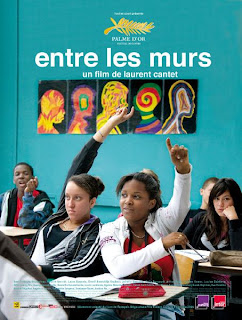The Class (Entre les Murs)

Perhaps the biggest surprise at this year's Oscars was the win by the Japanese film, Departures, in the Foreign Language category. These things always seem like surprises when all of the films haven't had a theatrical release in the U.S. Some have wrung their hands that Waltz With Bashir didn't win, but I doubt those who are crying about that have seen Departures, and should hold their disgust in abeyance. Of course, the voters for Foreign Language Film are notoriously out of step, being limited usually to older voters (Departures is about a person who works in a mortuary--maybe that strikes a chord with older people). In any event, Departures would have to be awfully good to beat the other film, besides Waltz, that has had a U.S. release--The Class, from France.
Directed by Laurent Cantet, The Class (or Entre Les Murs, Between the Walls, in the original French) is a stunning piece of a narrative version of Cinéma vérité. Based on a novel by a teacher, François Bégaudeau, The Class takes a microscopic look at life at an inner-city Paris middle school. Bégaudeau, in a stunning example of verisimilitude, plays the role of the teacher himself, and it's a remarkable performance for a non-actor. Almost equally remarkable is the performance by the various kids who make up his class. I suspect that some are professional actors, but I believe I read somewhere that many of them are not, but Cantet has coaxed out of them some of the most naturalistic performances by teens I've seen in a long time.
Film history is full of examples of teacher movies that are of a similar theme, such as Stand and Deliver, Dangerous Minds, and television shows such as Lucas Tanner. All feature dedicated teachers who refuse to give up on recalcitrant students. The Class is in that vein, but far less sentimental. To start with, Bégaudeau's teacher is not entirely noble. He loses his patience and in one key scene, makes a bad mistake by addressing two girls as "skanks." Secondly, not every student ends as a success story, even though some students offer surprises and hidden depths.
A friend of mine, a teacher, asked me if I wouldn't consider that profession, since I am out of work. I told him I didn't think I was cut out for it, and seeing this film only reinforced it. Despite the flaws of Bégaudeau's character, he comes across as dedicated and truly caring about his charges, even defending a student who creates a violent disruption in his classroom. Teachers have to put up with far more than I'd be able to handle. Even though this film is specifically French, and deals with a particular set of problems (I think many would be surprised to realize how racially diverse Paris is), this film should be shown to anyone who wants to be a teacher.
I'd also like to add kudos to whoever did the English subtitles. The class focused on the film is French, which of course is the equivalent to English class in English-speaking countries. There are sections where word definitions are discussed, as well as clauses of grammar, such as the imperfect subjunctive. That couldn't have been easy to translate.


Comments
Post a Comment